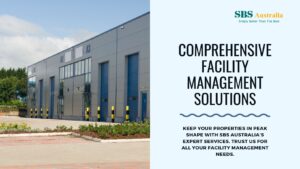What is Facilities Management?
Behind every well-run organization is quality facilities management ensuring optimal work environments. However, the discipline of facilities management encompasses far more than most people realize. Facilities management integrates multiple fields to coordinate and oversee numerous infrastructure and service activities within an organization.
The comprehensive facilities management function aims to create safe, comfortable, and efficient workplaces that both support business objectives and address employee needs. This critical business function typically includes overseeing areas such as real estate, workplace safety, custodial services, building systems maintenance, vendor management, moves/changes, sustainability efforts and more. Continue to read and we will share more details with you about what facilities management is all about.
The Role Played by Facilities Managers.
Facilities managers are responsible for ongoing management, maintenance, and upkeep of facilities. They strive to make the facilities sustainable and financially viable at all times. On top of that, facilities managers strive to provide an appropriate space so that people can enjoy staying.
Ensuring the Overall Sustainability of a Facility
One of the key responsibilities of a facilities manager would be to ensure sustainability. Sustainability is one of the core operational efficiencies. It is required to remain relevant in the location. Facilities managers focus on resource conservation, waste reduction, recycling, energy efficiency, and other green initiatives. By implementing sustainable practices, facilities managers
can reduce operating costs, promote corporate responsibility, comply with regulations, and maintain pleasant spaces.
Maintaining the Safety and Well-being of the Occupants
Facilities managers will also need to pay special attention to safety and wellbeing. It is about the integration of people with processes to ensure that the facility is safe for everyone. In other words, it ensures the good health of people, while preventing costly incidents. Facilities managers oversee workplace safety programs, emergency preparedness plans, ergonomics, and compliance with health and safety regulations. By promoting safe conditions, facilities managers protect human capital and mitigate risk.
Making Informed Decisions with Available Data
Another key area that facilities managers will need to focus on is technology and innovation. It is important to use the latest available technologies to build complex structures. It would ensure efficient operations as well. Moreover, technology provides key data to the facilities managers on all aspects of the facility. They range from indoor environment to safety and security.
With the availability of data, facilities managers will be able to make the right decisions to ensure safety and security. Technologies like building automation systems, sensor networks, cloud-based platforms, and computerized maintenance management software provide actionable insights. Staying on top of tech developments allows facilities managers to improve service delivery.
Being Innovative and Agile
Facilities managers need to be innovative and adaptable. Then they will be able to come up with better solutions to ensure better facilities management. They have to adjust to changing workplace trends, business needs, regulations, technologies, and more. Creative problem- solving enables them to optimize spaces.
Getting familiar with the business and its users
Facilities managers should also be familiar with understanding the businesses and their users. They need to be effective when managing the operational costs of a building. Then they can enhance the overall profitability of the business. By aligning facilities planning with business objectives and user needs, facilities managers allow companies to maximize productivity.
Facilities managers should ensure that the facilities are well maintained at all times. Moreover, they should ensure that the facilities are being used for their intended purpose. Proper utilization of space along with preventative, predictive, and corrective maintenance of assets ensures optimization.
Types of Facilities Management Services
Facilities management is an umbrella term encompassing many critical services. The exact facilities services overseen depends on the organization and specifications of the buildings and properties managed. Typical facilities management areas include:
Maintenance Services
Preventative maintenance helps delay system and component degradation. Predictive
maintenance uses technology to monitor assets and forecast needs. Corrective maintenance repairs broken equipment. Facilities managers coordinate all types of maintenance for optimal upkeep.
Custodial Services
Keeping interiors clean promotes health, satisfaction, and productivity. Facilities managers supervise general custodial duties like waste removal, sweeping and mopping. They also oversee services like window washing, carpet cleaning, pressure washing, lawn care and snow removal.
Utility Management
Facilities managers track utility usage, strive to reduce consumption, negotiate supplier agreements, identify billing errors, coordinate new utility installations, maintain onsite energy, and water systems and fulfill sustainability initiatives.
Security Management
Facilities managers design and implement physical security platforms encompassing access control, video surveillance, security personnel, protective barriers, locker management, parking management, emergency response protocols and more.
Real Estate Management
Facilities managers provide oversight regarding the purchase, sale, lease, valuation, and space allocation of facilities. They project future space utilization needs, track leases and property ownership details and make recommendations regarding real estate transactions.
Capital Planning
Facilities managers thoroughly assess building systems, assets, and market conditions to create short- and long-term capital forecasts in alignment with business objectives. They provide expert input on budgeting.
Telecom/IT Management
As technology becomes further integrated into building infrastructure, facilities managers increasingly interact with IT departments to coordinate cabling, data centers, network rooms, and other telecom spaces.
Interior Design
Facilities managers offer space planning insights and standards for architectural features, furniture, fixtures, equipment, accessories, lighting, wayfinding, signage, and general aesthetics.
Relocations Management
Facilities teams handle major aspects of relocating offices and shuffling departments including space design, furniture/equipment coordination, tech adjustments and move logistics.
Sustainability Management
Facilities managers track utility consumption, oversee recycling programs, ensure compliance with regulations, spearhead energy/water conservation and integrate green solutions.
Emergency Preparedness
Facilities managers develop emergency response plans, ensure adequate availability of first aid supplies, manage relationships with emergency providers, and coordinate preparedness drills.
Vendor Management
Facilities managers source, oversee, and evaluate the many outside service providers relied upon to deliver the vast array of FM services needed.
Inventory Management
Tools, spare parts, custodial supplies, office supplies and assets must be tracked and
maintained cost effectively with attention paid to inventory carrying costs.
Work Orders & Help Desk
Service requests are submitted to facilities departments through work order ticketing systems and/or help desks. Facilities managers set up protocols.
Final Words
Modern organizations cannot function properly without safe, compliant and efficient workspaces. With robust planning, technical skills, management prowess and creative problem solving, facilities management teams keep people protected and organizational missions progress through the unified goal of service delivery. The expansive scope, strategic influence and service-focused principles of facilities management give this profession meaningful impact.







